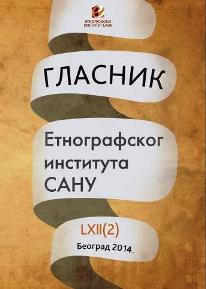Миграције из Горе крајем двадесетог и почетком двадесет првог века
Migrations from the Gora Region at The End of the 20th and the Beginning of the 21st Century
Author(s): Jadranka Đorđević-CrnobrnjaSubject(s): Anthropology
Published by: Етнографски институт САНУ
Keywords: Economic migration; political migration; Gora; Gorani people; 1999.
Summary/Abstract: In this paper I will analyze economic and political migration in the Gora region at the end of the 20th and in the first decade of the 21st century. It is my intent to consider and explain their cause and their intensity and scope. In short, I view the socioeconomic and political dimension of these migrations from an ethnological and anthropological point of view. The economic and political migrations from the Gora region at the end of the 20th and the beginning of the 21st century represent the continuation of earlier migrations, albeit more intensive and larger in scope (whole families are migrating). There migrations can be viewed as the effects of political changes in Kosovo, as well as the socioeconomic crisis of the 1990’s. There are no fixed boundaries between these types of migrations, and the only truly stand out examples are the cases in which people migrated for safety reasons. A certain type of migration can be identified based on the terminology used by the interlocutors. I have encountered the terms “banishment” and “displacement” in the narrative discourse of my interlocutors. These terms are used to describe the migrations from Gora during the 1999 war, as well as immediately after. The differences between economic and political migrants can be gouged from other factors such as going to Gora during vacations and holidays as well as investingmoney into real-estate in the region. Individuals who emigrated from Gora because they feared for their and the loves of their families go to Gora rarely (to attend funerals for example) and are not currently thinking of investing unlike those who had left Gora as economic migrants. There are no differences when it comes to where people migrate to for different reasons. Places of migration can, however, be indicative of the form of migration in the sense of whether people migrated to a foreign country or not. One can turn into the other due to the changing of state borders. Thus migrations from Gora to cities and towns in Serbia became international after Kosovo declared independence. In this context, migrations from Gora to Serbia can be defined twofold, both at the level of the individual and at the level of the community. This leads to the conclusion that, in the case of migrations which are the focus of this paper, one needs to be careful not only of their typology, but also their conceptualization as well as the positions from which a certain migration is conceptualized.
Journal: Гласник Етнографског института САНУ
- Issue Year: LXII/2014
- Issue No: 2
- Page Range: 35-47
- Page Count: 13
- Language: Serbian

